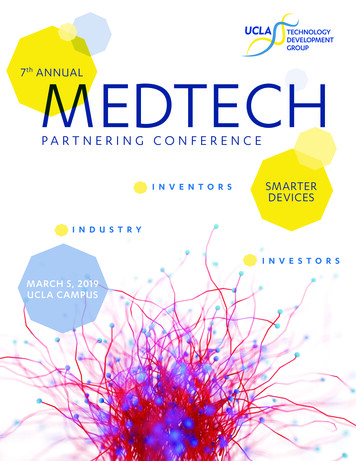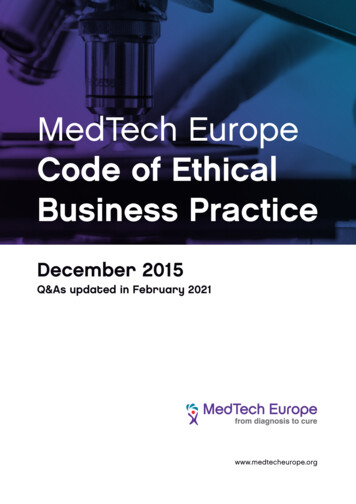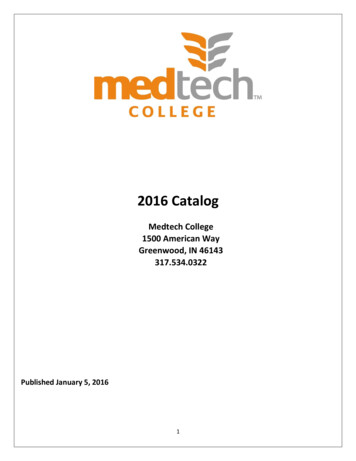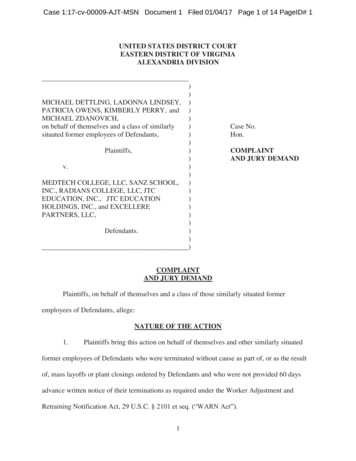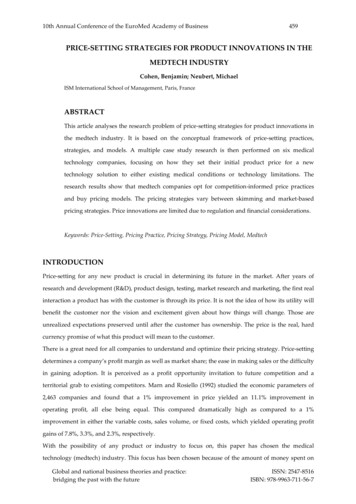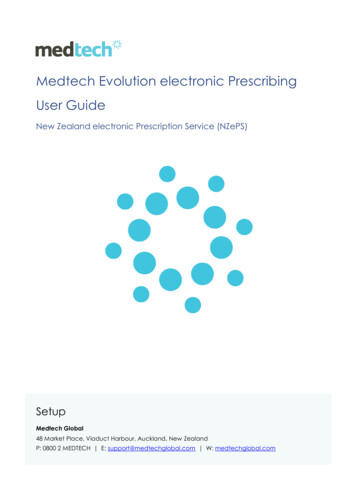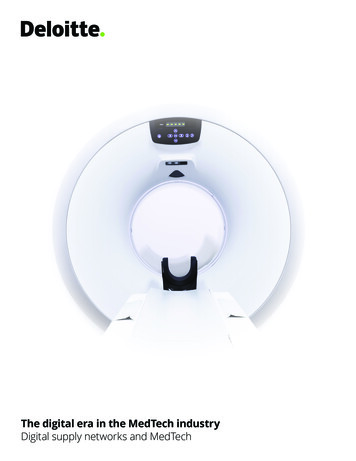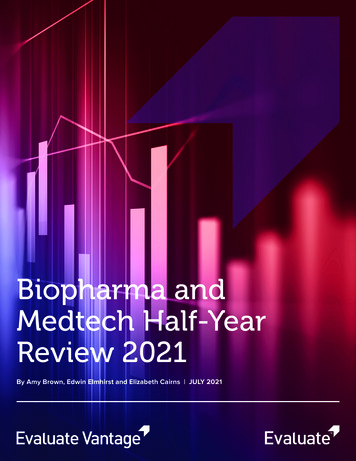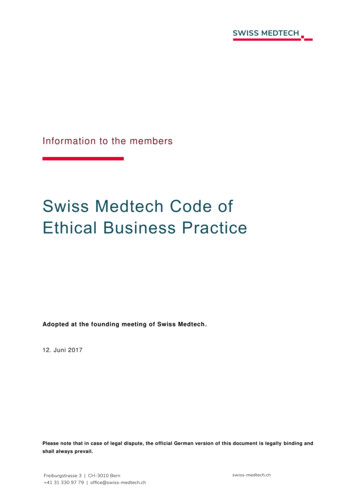
Transcription
Information to the membersSwiss Medtech Code ofEthical Business PracticeAdopted at the founding meeting of Swiss Medtech .12. Juni 2017Please note that in case of legal dispute, the official German version of this document is legally binding andshall always prevail.
ContentsCONTENTS .1PRELIMINARY NOTE .3INTRODUCTION .4Promoting an Ethical Medical Technology Industry .4Key Legislation .4Aims and Principles of the Code .5Interpreting the Code .6Administering the Code .6Entry into Force .7PART 1: GUIDELINES ON THE INTERACTIONS WITH HEALTHCARE PROFESSIONALSAND HEALTHCARE ORGANISATIONS .8Chapter 1: General Criteria for Events .81.2.3.4.5.6.Chapter 2:Event Programme .8Event Location and Venue .8Guests .9Reasonable Hospitality .9Travel .9Transparency . 10Third Party Organised Educational Events . 101.Third Party Organised Educational Conferences . 102.Third Party Organised Procedure Training . 11Chapter 3: Company Events . 111.2.3.Chapter 4:General Principles . 11Product and Procedure Training and Education Events . 11Sales, Promotional and Other Business Meetings . 11Grants and Charitable Donations . 121.2.3.4.Chapter 5:General Principles . 12Charitable Donations . 13Educational Grants . 14Research Grants . 15Arrangements with Consultants . 161.2.3.4.Chapter 6:General Principles . 16Criteria for genuine consulting arrangements . 16Remuneration and Fair Market Value . 17Disclosure and Transparency . 17Research . 181.Member Company-Initiated Research . 18page 1/29
2.Member Company Post-Market Product Evaluation . 193.Third Party-Initiated Research . 19Chapter 7: Royalties . 19Chapter 8: Educational Items and Gifts . 20Chapter 9: Demonstration Products and Samples . 211.General Principles . 212.Demonstration Products (Demos) . 223.Samples . 22P A R T 2 : I n t e r p r e t a t i o n a n d M e d i a t i o n P r o c e d u r e s . 23Chapter 10: General Conditions . 23Chapter 11: Competent Bodies . 23Swiss Medtech Legal & Compliance Commission Specialist Group («L&C») . 23Swiss Medtech General Counsel . 23Chapter 12: Procedural Principles for Interpretation Issues . 23Chapter 13: Mediation . 24PART 3: GLOSSARY AND DEFINITIONS . 25page 2/29
Preliminary noteFASMED and Medical Cluster have joined forces to form Swiss Medtech. FASMED was amember of MedTech Europe prior to the merger. As a result of the union, this European umbrella organisation membership will be transferred to Swiss Medtech.MedTech Europe implemented the MedTech Europe Code of Ethical Business Practice as of1 January 2016. Its enforcement shall take place in severa l steps. The MedTech Europe Codeof Ethical Business Practice is valid for members of the MedTech Europe Association, as wellas for national Organisations such as Swiss Medtech, which are required to adopt the European Code at national level as minimum requirements for their members.In principle, Swiss Medtech does not wish to adopt provisions deviating from the EuropeanCode. The Association has adopted the meaning of the European Code to the greatest po ssible extent and has adapted it as part of the present Swiss Medtech Code of Ethical BusinessPractice («Code»). The definitions used in the European Code have be en adopted and arelisted in the Glossary of this Code.All terms and phrases in italics and bold print are defined in Part 3: Glossary. The AcrobatPDF electronic version contains short versions of the definitions which appear when thecurser is positioned over the terms or phrases. Legal liability applies solely to the definitionlisted in the Glossary and not to the short definition which appea rs upon mouse click.Concerning future developments, the Swiss Medtech Executive Board is authorised to issueimplementation decrees based on the Code.The present Code was approved at the founding meeting of the Swiss Medtech Associationon 12 June 2017. Members and Member Companies commit to comply with the Code uponthe granting of their Swiss Medtech Association membership.page 3/29
IntroductionPromoting an Ethical Medical Technology IndustrySwiss Medtech represents the medical technology industry in Switzer land. In addition to representing, networking, and advancing the medical device industry, our mission is to promote abalanced policy environment which enables the medical technology industry to meet th e growing Healthcare needs and ethical expectations of its stakeholders.Swiss Medtech recognises that compliance with applicable laws and regulations as well asadherence to ethical standards are both an obligation and an critical step to the achievementof the aforementioned goals; they also enhance the rep utation and success of Members andMember Companies.This Code sets out the minimum standards appropriate to the various types of activities carried out by the Members and Member Companies. The Code is not intended to supplant or supersede national laws or regulations or professional codes (including Members and MemberCompanies’ own Codes of Practice) that impose stricter requirements that may impose morestringent requirements. All Members and Member Companies should independently ascertainthat their activities comply with all current national and local laws, regulations and professional codes.Should a Member or Member Company engage third parties (such as sales & marketing intermediaries, consultants, distributors, sales agents, marketing agents, broker s, commissionairecommercial agents or independent sales representatives) who interact with Healthcare Professionals or Healthcare Organisations in connection with the sale, promotion or other activities related to the Member’s and Member Company’s products and services, it is recommended that these third parties be contractually obliged to comply with provisions set out inthis Code as a guideline for conduct, provided that these third parties are not members ofSwiss Medtech themselves.Key LegislationSwiss Medtech underlines compliance with the following laws as having particular relevanceto Members and Member Companies: Safety, Quality and Performance Laws; Advertising and Promotion Laws; Data Protection Laws; Anti-corruption Laws; Environmental, Health and Safety Laws; Competition Laws (Antitrust Law, Law on Unfair Competition).page 4/29
Competition legislation applies not only to Members and Member Companies in their businessoperations, but also to Swiss Medtech and all its Specialist Groups, regardless of s ize andname. A Member or Member Company may be held liable for violations of antitrust laws byother Members and Member Companies. Therefore, Members and Member Companies mustmake every effort to observe competition laws in all their interactions.Aims and Principles of the CodeThe interaction between Members and Member Companies and Healthcare Professionals,and Healthcare Organisations is an important feature in achieving the mission to make safe,innovative, and reliable technology and related services available to more people, for examplethrough the: Advancement of Medical TechnologiesThe development of innovative medical devices, technologies and in vitro diagnostics,as well as the improvement of existing products require collaboration between Membersand Member Companies and Healthcare Professionals, and Healthcare Organisations.Innovation and creativity are essential to the development and evolution of medicaltechnologies and / or related services Safe and Effective Use of Medical TechnologyThe safe and effective use of medical technology and related services requires Members and Member Companies to offer Healthcare Professionals and Healthcare Organisations appropriate instruction, education, training, service and technical support. Research and EducationMembers and Member Companies' support of bona fide medical research and ed ucation, serves to enhance Healthcare Professionals clinical skills and thereby contribute topatient safety and increase access to new technologies and / or related ser vices.In each such interaction, Members and Member Companies must continue to respect the obligation of Healthcare Professionals to make independent decisions regarding treatment andsafeguard the environment in which the interaction takes place to ensure the integrity of theindustry. To achieve this aim, the Code provides guidance on the interactions of Members andMember Companies with both Healthcare Professionals and Healthcare Organisations, basedon the following underlying principles: The Principle of Image and Perception:Members and Member Companies should, at all times, consider the image and perception of the medical technology industry that will be projected to the public when interacting with Healthcare Professionals and Healthcare Organisations.page 5/29
The Principle of Separation:Interaction between Members and Member Companies and Healthcare Professionals /Healthcare Organisations must not be misused to influence through undue or improperadvantages, purchasing decisions, nor should such interac tion be contingent upon salestransactions or use or recommendation of Member or Member Companies' products. The Principle of Transparency:Interactions between Members and Member Companies and Healthcare Professionals /Healthcare Organisations must be transparent and comply with national and local laws,regulations, or professional codes of conduct. Members and Member Companies shallmaintain appropriate transparency by requiring prior written notification to the hospitaladministration, fully disclosing the purpose and scope of the interaction. The Principle of Equivalence:Where Healthcare Professionals are contracted by a Member or Member Company toperform a service for or on behalf of a Member or Member Company, the remunerationpaid by the Member or Member Company must be commensurate with, and represent afair market value for, the services provided by the Healthcare Professional. The Principle of DocumentationAll such services and reciprocal services return must be documented in writing and retained so that the information may be traced and verified at all times. Among otherthings, the following must be documented: the objective and purpose of the interaction,the services needing further definition and / or those which have already been performed, as well as the financial remuneration, and which party is responsible for bearingthe costs.Interpreting the CodeThe most important terms of this Code are set out in the Glossary. Terms such as «among»,«including», «in particular», or similar words are to be defined as clearly as possible andshould not limit the meaning of the terms and concepts.Administering the CodeThe Members and Member Companies, as well as the companies which fall under commoncontrol, are required to implement the Code as a minimum standard in the following cases:a.The Members and Member Companies collaborate with Healthcare Professionals andHealthcare Organisations which are active in Switzerland; andb.The activities take place in Switzerland, regardless of where the Healthcare Professionalsand Healthcare Organisations are registered and practicing.page 6/29
Entry into ForceThis Code enters into force on the occasion of the Swiss Medtech founding meeting of 12June 2017. The prohibitions defined in Chapter 2: Third Party Organised Education Eventsand in Chapter 4: Grants and Charitable Donations, Section 3: Educational Grants of theSwiss Medtech Code of Ethical Business Practice, direct financial or material s upport forHealthcare Professionals to cover their cost of participation in Third Party Organised Educational Events shall enter into force on 1 January 2018.page 7/29
PART 1: Guidelines on the Interactions withHealthcare Professionals andHealthcare OrganisationsChapter 1: General Criteria for EventsMembers and Member Companies may invite Healthcare Professionals to Company Events aswell as provide funding for Third Party Organised Educational Events . The principles and criteria set out in this Chapter 1 shall apply to all such Events supported in any way by Membersand Member Companies, irrespective of who organises the Event.1.Event ProgrammeThe Event programme should directly relate to specialty and/or medical practice of theHealthcare Professionals who will attend the Event, or be sufficiently relevant to justify the attendance of the Healthcare Professionals. For Third Party Organised Educational Events, theagenda should be under the sole control and responsibility of the third party organiser.A Member or Member Company shall not organise Events which include social, sportingand/or leisure activities or forms of Entertainment. For Third Party Organised EducationalEvents, Entertainment must be outside of the educational programme schedule and paid forseparately by the Healthcare Professionals. Entertainment should not dominate or interferewith the overall scientific content of the progr amme and must be held during times that do notoverlap with a scientific session. The Entertainment should not be the main attraction of theThird Party Organised Educational Event.2.Event Location and VenueLikewise, the Event location and venue should not become the main attraction of the Event.For the location and the venue, Members and Member Companies must take into account atall times the following considerations: Potential adverse public perception of the location and venue for the Event. The perceivedimage of the location and venue must not be luxury, or touristic/holiday -oriented, or that ofan Entertainment venue. The Event location and venue should be centrally located when regard is given to theplace of residence of the majority of the invited participants. The need for ease of access for attendees The Event location and venue should be in or near a town which is a recognised scientificor business centre, suitable for hosting an Event which is conducive to the exchange ofideas and the transmission of knowledge.page 8/29
3.Members and Member Companies must take into account the season during which theEvent is held. The selected time of year must not be associated with a touristic season f orthe selected geographical location.GuestsMembers and Member Companies are not permitted to facilitate or pay for meals, travel, accommodation or other expenses for Guests of Healthcare Professionals, or for any other person who does not have a bona fide professional interest in the information being shared at theEvent.4.Reasonable HospitalityMembers and Member Companies may provide reasonable hospitality to Healthcare Professionals in the context of Company Events and Third Party Organised Educational Events butany hospitality offered must be subordinate in time and focus to the Event purpose.The Code seeks to find a balance between the courteous and professional treatment ofHealthcare Professionals by Members and Member Companies; with the desire to avoid eventhe appearance that hospitality may be used by Members and Member Companies as ameans to induce Healthcare Professionals to purchase, prescribe or recommend Member andMember Companies’ products.Accordingly, Members and Member Companies must assess what is «reasonable» in anygiven situation.Members and Member Companies may not pay for or reimburse Healthcare Professionals'lodging expenses at top category or luxury hotels. As a rule, accommodation in a congresshotel is permitted, provided the requirements of the Code are met. The cost of accommodation and/or other services provided to the Healthcare Professionals should not cover a periodof stay beyond the official duration of the Event.5.TravelMembers and Member Companies may only pay or reimburse for reasonable and actualtravel. Complete (or partial) assumption of costs may be undertak en so long that legal requirements are taken into account. Travel provided to Healthcare Professionals should notcover a period of stay beyond the official duration of the Event.For air travel, in principle, this means that Members and Member Companies can only pay foror reimburse economy or standard class unless the flight time) is of a duration of greater than5 hours including connection flights, in which case business class can be considered. Ticketsfor a higher class than business (e.g., first class) are never appropriate.page 9/29
6.TransparencyMembers and Member Companies must ensure full compliance with applicable laws, regulations, and professional codes of conduct regarding the disclosure or approval requirementsassociated with financial support. An Employer Notification must be completed prior to everyEvent.Chapter 2: Third Party Organised Educational EventsMembers and Member Companies may provide financial and/or in kind support (e.g. products)to Third Party Organised Educational Events . Such events include: Third Party Organised Educational Conferences; and Third Party Organised Procedure Training meeting.1.Third Party Organised Educational Conf erencesMembers and Member Companies may support in cash and/or in kind Third Party OrganisedEducational Conferences provided that: The requirements according to Chapter 1: General Criteria for Events are met; Approval by the Conference Vetting System has been granted for international participants and The provision of support is permitted under applicable laws, regulations and professionalcodes of conduct.Such forms of support could be, for example:a.Educational GrantsPlease refer to Chapter 4: Grants and Charitable Donations, Section 3: EducationalGrants for guidance on Educational Grantsb.Promotional ActivityMembers and Member Companies may purchase packages that may include promotional and advertising services, for example, advertisement space and booth space forcompany displays. Members and Member Companies should ensure that the overall image projected by the promotional activity at Third Party Organised Educational Conferences is perceived as professional at all times. It should never bring dis credit uponMember and/or Member Company or reduce confidence in the medical technology industry.c.Satellite SymposiaMembers and Member Companies may purchase satellite symposia packages at ThirdParty Organised Educational Conferences and provide presentations on subjects thatare consistent with the overall content of the Third Party Organised Educational Conference. Members and Member Companies may determine the content at these satellitesymposia and be responsible for speaker selection.page 10/29
2.Third Party Organised Procedure TrainingMembers and Member Companies may support Third Party Organised Procedure Training either via Educational Grants (in accordance with Chapter 4: Grants and Charitable Donations,Section 3: Educational Grants), or by providing financial support directly to individualHealthcare Professionals to cover the cost of attendance at Third Party Organised Educational Events, in accordance with the following rules: The requirements defined in Chapter 1: General Criteria for Events are met; Approval by the Conference Vetting System has been granted for international participants and Such provision of support is permitted under applicable laws, regulations, and professional codes of conduct.Chapter 3: Company Events1.General PrinciplesMembers and Member Companies may invite Healthcare Professionals to Company Events.Such Events include, as defined in the Glossary: Product and Procedure Training and Education Events Sales, Promotional, and Other Business MeetingsCompany Events should comply with the principles mentioned in Chapter 1: General Criteriafor Events.Where there is a legitimate business purpose, Company Events may include or take place inMember or Member Company’s manufacturing plant, or Healthcare Organisations, used bythe Member or Member Company as reference centres.2.Product and Procedure Training and Education EventsWhere appropriate, in order to facilitate the safe and effective use of medical technologies,therapies and/or services, Members and Member Companies should make Product and Procedure Training and Education Events available to relevant Healthcare Professionals.Members and Member Companies shall ensure that personnel conducting the Product andProcedure Training and Education Events have the appropriate expertise to conduct suchtraining.3.Sales, Promotional and Other Business MeetingsMembers and Member Companies may organise Sales, Promotional and Other BusinessMeetings where the objective is to discuss product and r elated services, features and benefits, conduct contract negotiations, or discuss sales terms.page 11/29
In addition to the principles laid down in Chapter 3: Company Events, Section 1: General Principles, Sales, Promotional and Other Business Meetings should also comply with the followingrequirements: Such meetings should, as a general rule, occur at or close to the Healthcare Professional's place of business; It is not appropriate for travel or accommodation support to be provided to Healthcare Professionals except where demonstrations of non-portable equipment are necessary.Chapter 4: Grants and Charitable Donations1.General PrinciplesGrants and Charitable Donations shall not be contingent in any way on past, present orpotential future purchase, lease, recommendation, prescription, use, supply or procurements of Members and Member Companies’ products or services. It is important thatsupport of charitable and/or corporate philanthropic programmes and activities by Members and Member Companies is not be viewed as a price concession, reward for favoured customers or as an inducement to purchase, recommend, prescribe, use, supplyor procure Member or Member Companies’ products or services.A Member or Member Company shall not provide Grants or Charitable Donations to individual Healthcare Professionals. Grants and Charitable Donations must be provideddirectly to the qualifying organisation or entity, as the case may be. Grants and Charitable Donations shall not be provided in response to requests made by Healthcare Professionals unless the Healthcare Professional is an employee or officer of the qualifyingHealthcare Organisation and submits the request in writing on behalf of the qualifyingHealthcare Organisation.The payment (or provision of other support) by way of any Grant or Charitable Donation shall always be made out in the name of the r ecipient Healthcare Organisation andshall be paid directly to the organisation. Grants and charitable donations may not beprovided in the name of any Healthcare Professional and all Grants and Charitable Donations shall identify the Member or Member Company as the provider of the Grant orCharitable Donation.It must in all cases be lawful under applicable laws, regulations and professional codesof conduct for the Grant or Charitable Donation recipient to receive and benefit from theparticular type of Grant or Charitable Donation.Members and Member Companies shall implement an independent decision-making/review process to identify, prevent and mitigate against poten tial bribery and corruptionrisks arising in connection with the provision of a Grant or Charitable Donation. Thisprocess shall include a documented, prior evaluation of any such associated risks andof the relevant information concerning the intended rec ipient organisation or entity.page 12/29
All Grants and Charitable Donations must be appropriately documented by the Memberor Member Company. Moreover, Grants and Charitable Donations shall only be provided in response to a written request submitted by requesting Healthcare Organisationor documented initiative from a Member or Member Company containing sufficient information to permit an objective evaluation of the request to be carried out by the Memberor Member Company. No Grant or Charitable Donation shall be provided until a writtenagreement documenting the terms of this has been signed by both parties.This Chapter 4 is not intended to address the legitimate practice by Members or Member Companies of providing appropriate rebates, additional product and/or service offerings, including free of charge, or other comparable pricing incentive mechanisms(«value adds») which are included in competitive and transparent centralised purchasing arrangements, such as, for example, tenders.2.Charitable DonationsCharitable Donations within the meaning of this Code may be made only to entities whichhave charitable and/or philanthropic purposes as their main purposes and which are objectively engaged in genuine charitable and/or philanthropic activities.The differences between limited and unrestricted Charitable Donations must be distinguished.«Restricted» in this context means that the Member or Member Company determines the purpose of the Charitable Donation. «Unrestricted» in this context means that Member or Member Company shall have no control over the final use of funds (or other support) beyond general restrictions to ensure that the Charitable Donation is applied for charitable and/or philanthropic purposes.In principle, the Charitable Donations are to be granted without restriction.Restricted Charitable Donations to non-profit hospitals may be permitted in case of demonstrated financial hardship, when Charitable Donations serve exclusively the benefit of the patient, are limited in value, or are explicitly permi tted by applicable laws, regulations, and professional codes of conduct. A Healthcare Organisation is considered to be in financial hardship in the event of extreme and unavoidable financial distress resulting from matters outsidethe Healthcare Organisation's control where the Healthcare Organisation is unable to operateand where patient care is consequently jeopardised. Financial distress resulting in whole or inpart from mismanagement of the Healthcare Organisation's funds or other matters within theHealthcare Organisation's control is not be considered to be financial hardship.This Chapter 4 is not intended to address the legitimate commercial transactions by Membersor Member Companies in the form of leasing stands or booth space at Third Party OrganisedEducational Events and/or at any conference or Event organised by a charity or othe
FASMED and Medical Cluster have joined forces to form Swiss Medtech. FASMED was a member of MedTech Europe prior to the merger. As a result of the union, this European um-brella organisation membership will be transferred to Swiss Medtech. MedTech Europe implemented the MedTech Europe Code of Ethical Business Practice as of 1 January 2016.

